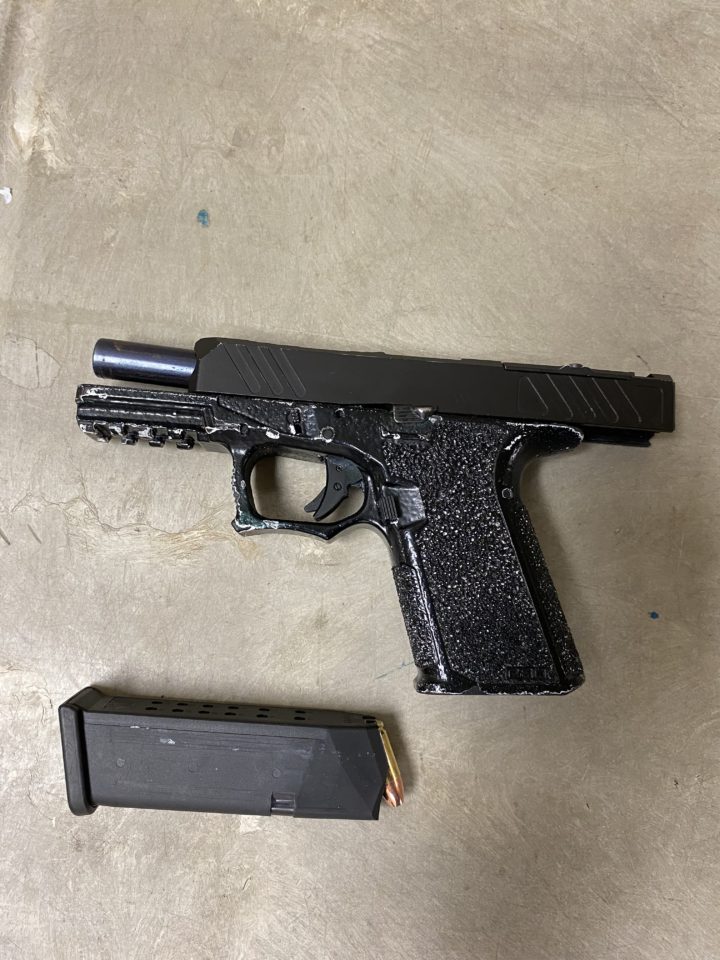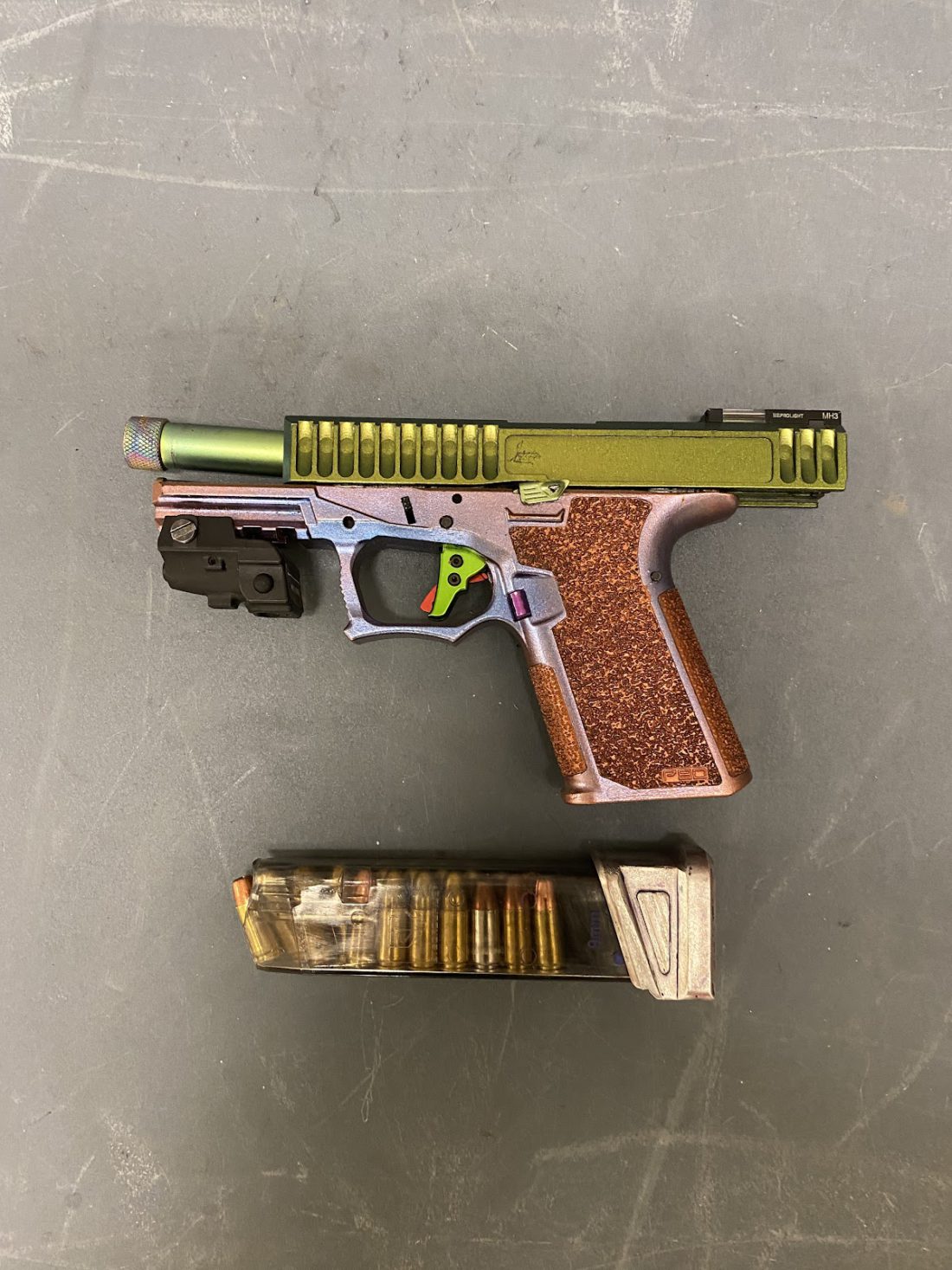The Asheville Police Department is used to seizing and documenting weapons found during criminal investigations. But recently, the department found itself needing a new category: ghost guns.
“It definitely sounds scary,” says Asheville police Capt. Joe Silberman. “But we know we’re also seeing more of them.”
The term ghost gun refers to untraceable firearms that were made or assembled at home. They do not contain serial numbers, making them untraceable to law enforcement, Silberman says.
Asheville police recovered five ghost guns in 2022 and three so far this year, says APD spokesperson Samantha Booth. Data before 2022 is not available because the department had no method of tracking the firearms.
“We did not start seeing ghost guns until 2022,” says Booth. “Because of record-keeping, we might have recovered ghost guns [before 2022], but the way that we’re recording them now is easily searchable.”
National data shows that in 2021 alone, approximately 20,000 suspected ghost guns were recovered by law enforcement in criminal investigations and reported to the U.S. Bureau of Alcohol, Tobacco, Firearms and Explosives, a tenfold increase from 2016.
As lawmakers in North Carolina decide how to regulate the weapons — if at all — gun shop owners and local law enforcement officials say that education is the best hope to keep untraceable or stolen guns off the street.
Old school, new school
Silberman, who has worked in criminal investigations at APD since 2003, says while the name may elicit fear, ghost guns refer to homemade firearms, which have existed essentially since gunpowder was discovered. “People have been making their own guns in this country for a long time,” he notes.

The first ghost guns were referred to as “zip guns,” he explains, and were often a haphazard arrangement of tools and materials, such as pipes and even rubber bands. Manufacturers began standardizing firearms in the U.S. more than a century ago, says Silberman. For decades, building homemade guns was arduous and mostly unappealing to anyone other than hobbyists. That changed, Silberman explains, with the emergence of so-called “80-percenters” — guns that are 80% complete with the remaining 20% to be built by the purchaser through easily available parts. Those who purchase the incomplete gun kits have to finish the job, which often means using a Dremel to mill out the gun and add parts such as triggers. By selling the guns as incomplete, distributors avoid having to meet the same federal requirements as fully built firearms.
Gun kits, which are widely available online, caused the industry to burgeon over the last two decades. Among the most popular self-manufactured guns is the Nevada-based Polymer 80 pistol, which can be purchased both in gun stores or online, says Silberman. All of the ghost guns recovered in Asheville were Polymer 80s.
The use of 3D printers to produce homemade guns also has grown in popularity, he adds, with source code for almost any gun imaginable being freely available, including submachine guns, pistols and AR-15 rifles.
Rules and regulations
While the Second Amendment guaranteed citizens the right to own firearms, regulation around the transfer and sale of guns stretches back to the 1930s. In 1968, President Lyndon B. Johnson signed the Gun Control Act, which prohibited mail order of firearms and required firearms to contain serial numbers to prevent illegal gun sales and make it easier to solve crimes, among other regulations. The bill was prompted in part by the assassinations of civil rights leader the Rev. Martin Luther King Jr. in 1968 and President John F. Kennedy in 1963. Kennedy was shot and killed with a mail-order rifle.
Matt Hampton, who owns Asheville Armory, a shop that sells firearms and training classes, holds a federal firearms license that requires him to log all sales and serial numbers and conduct background checks on new gun owners.
“We’re the record-keepers,” says Hampton, who’s been in the firearms business for about 10 years. He says he has hundreds of books filled with records of every gun sold at his store.
People can purchase from Asheville Armory directly or pick up guns from online or person-to-person sales. All of those types of transfers include logging information about the buyer and seller, along with the serial numbers for the firearms.
Ghost gun kits and other homemade firearms exist in a legal gray area, Hampton says. Building firearms is perfectly legal, but the weapons may not be resold after they are built and cannot be transported across state lines. Because of their homemade nature, ghost guns are not required to have serial numbers. North Carolina does not require a background check via the National Instant Criminal Background Check System, or proof of a concealed-carry license to buy ghost gun kits. Age verification is not required through many online stores.
Silberman says that loophole creates the potential for the weapons to end up in the wrong hands, such as those convicted of a felony or those with serious mental illnesses.
“People buy [gun kits] for a number of different reasons, like a lot of firearms. Ghost guns can be made by people as a novelty, or people who want to get into gunsmithing,” Silberman explains. “But there is a certain segment of the population that wants to use them because they can’t legally acquire a firearm.”
Buzzwords?
While both Silberman and Hampton acknowledge that there is legitimate concern over people unlawfully purchasing untraceable guns, they say that gun kits may not be the most effective or easiest way for criminals to obtain weapons.

“‘Ghost gun’ is a political term. It’s like a broad generalization of something that was made up by someone who doesn’t have a clue,” says Hampton. “It’s definitely a term to scare people.”
The skill level and tools required to finish building guns from online gun kits may be a deterrence to many would-be purchasers. Silberman says it’s not uncommon to see poor construction of the weapons that make them difficult or impossible to use.
“We’ve seen ones where the barrel on the gun did not match the caliber of the gun that was loaded. And that’s actually not uncommon in the criminal community because there’s a lot of ignorance surrounding guns when people acquire [guns] irresponsibly,” he says. “I have also known people who’ve [built guns] and they’re competent, handy people, but the product is always much poorer than if you had a professionally made gun.”
Hampton adds that the total cost of gun kits and parts are roughly equal to those bought secondhand from private sales or at a gun show without the trouble of building the gun.
As for how well 3D-printed guns work? Not great, says Silberman. “You can YouTube 3D-printed guns and see them fail-testing them, and they don’t last that long, but essentially long enough, and then you just 3D-print another one,” he says.
Despite those obstacles, the weapons have been used in hundreds of high-profile killings around the country. In February, a ghost gun was used to kill a police officer in Fresno County, Calif.; last year, a 14-year-old boy was charged with using a ghost gun to kill a classmate in New Mexico; and a ghost gun was among the weapons found after a shooter in Colorado Springs carried out a deadly mass shooting in November.
Skirting the law
Both Silberman and Hampton say that while ghost guns can circumvent gun regulations, other gun-related issues are more common and concerning. Among those are the prevalence of stolen guns, says Silberman, which tend to be the most popular way that firearms end up in the hands of criminals.
“A lot of the problems we encountered are — and this isn’t a dig at gun owners — but people in general, don’t record their [firearms] well, and they don’t secure them,” Silberman says. “And we see that play out with guns because we take stolen firearms very seriously.”
He says that reports of guns stolen out of vehicles and homes are almost a daily occurrence in Asheville and that a majority of gun owners do not keep records of serial numbers, making it difficult for law enforcement to trace the weapons. Booth says APD recovered 36 stolen guns in 2022 and 25 so far in 2023.
“[Ghost guns] do not create a unique problem,” Silberman says. “The big worry is as they become more popular and as people lose them, there will be no way to track that.”
Hampton, meanwhile, says that criminals also obtain guns through “straw purchases,” in which a person is paid to buy a gun for another person who can’t buy them legally. While the original purchaser may be held accountable if the gun is found to be used in a crime, prosecution of straw purchases is rare, according to a 2018 report from the Johns Hopkins Bloomberg School of Public Health.
Hampton adds that so-called “gun show loophole” allows people to purchase weapons without requiring private sellers to conduct background checks or confirmation that someone can legally own firearms. Gun owners also can legally sell or give guns to other people without background checks or record-keeping.
That trading of hands can lead to a potential felony for the original gun owner if the gun ends up with someone who isn’t allowed to legally own the weapons.
“I could buy a gun and give it to my brother, and then he could sell it to the neighbor. And then the neighbor could sell it at a gun show. I’ve seen the same gun at a gun show go through about six hands and come back to me,” says Hampton. “It’s legal, but [sellers] are taking a chance.
Hampton says that recent legislation aimed at regulating ghost guns requires that he register gun kits and add serial numbers, which he calls a step in the right direction. That said, ghost gun owners must bring the firearms into his store to do so, he adds. “No one’s bringing me the 80-percenters,” he says.
Hampton adds that education on responsible ownership and gun laws would go a long way in preventing firearms from ending up on the streets.
“The easiest thing is just education. Education on where your guns are going to go, how to keep your guns, how to keep your serial numbers and training,” Hampton says. “Use common sense. Lock up your gun. If you’re driving, lock your car, don’t leave it on your seat. And, you know, one thing would be cool, too — just go to a dealer to do a transfer. I mean, it’s one extra step.”




The number of Buncombe County courthouse cases where ghost guns are featured in the evidence is not covered by this MX piece or the following WLOS story.
The following MX graph from this story says things about other parts of the country; but the other factor with a large percentage of any kind of gun crime — and the seemingly random Asheville gunfire — is High Magnitude Casualty – Organized Crime Narcotics. The traffickers fire their weapons to intimidate other organized crime players and dominate territories… one can imagine at least.
Not to misdirect from all the types of gun deaths, how much of the crime in Asheville involves stolen and ghost guns versus crimes the registered owner is responsible for?
“Despite those obstacles, the weapons have been used in hundreds of high-profile killings around the country. In February, a ghost gun was used to kill a police officer in Fresno County, Calif.; last year, a 14-year-old boy was charged with using a ghost gun to kill a classmate in New Mexico; and a ghost gun was among the weapons found after a shooter in Colorado Springs carried out a deadly mass shooting in November.”
https://wlos.com/news/local/huge-increase-in-ghost-guns-recovered-during-other-crimes-in-asheville-1000-percent